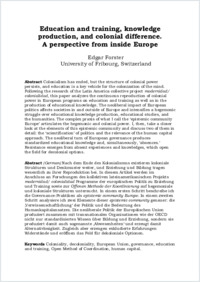Education and training, knowledge production, and colonial difference. A perspective from inside Europe
- Forster, Edgar Université de Fribourg, Suisse
-
2016
28
Coloniality
decoloniality
European Union
governance
education and training
Open Method of Coordination
human capital
English
German
Colonialism has ended, but the structure of colonial power persists, and education is a key vehicle for the colonization of the mind. Following the research of the Latin America collective project modernidad/ colonialidad, this paper analyzes the continuous reproduction of colonial power in European programs on education and training as well as in the production of educational knowledge. The neoliberal impact of European politics affects societies in and outside of Europe and intensifies a hegemonic struggle over educational knowledge production, educational studies, and the humanities. The complex praxis of what I call the ‘epistemic community Europe’ articulates the hegemonic and colonial power. I, then, take a closer look at the elements of this epistemic community and discuss two of them in detail: the ‘scientification’ of politics and the relevance of the human capital approach. The neoliberal turn of European governance produces standardized educational knowledge and, simultaneously, ‘absences.’ Resistance emerges from absent experiences and knowledges, which open the field for decolonial options.
Nach dem Ende des Kolonialismus existieren koloniale Strukturen und Denkmuster weiter, und Erziehung und Bildung tragen wesentlich zu ihrer Reproduktion bei. In diesem Artikel werden im Anschluss an Forschungen des kollektiven lateinamerikanischen Projekts modernidad/ colonialidad Programme der europäischen Politik zu Erziehung und Training sowie zur Offenen Methode der Koordinierung auf hegemoniale und koloniale Strukturen untersucht. In einem ersten Schritt beschreibe ich die Governance-Praktiken als epistemic community Europe. In einem zweiten Schritt analysiere ich zwei Elemente dieser epistemic community genauer: die ‚Verwissenschaftlichung‘ der Politik und die Bedeutung des Humankapitalansatzes. Die neoliberale Politik der Europäischen Union produziert zusammen mit transnationalen Organisationen wie der OECD nicht nur standardisiertes Wissen über Bildung und Erziehung, sondern sie produziert damit auch sogenannte ‚Abwesenheiten‘ und erzeugt damit Alternativlosigkeit. Zugleich aber erzeugen exkludierte Erfahrungen Widerstände und eröffnen das Feld für dekoloniale Optionen.
- Faculty
- Faculté des lettres et des sciences humaines
- Department
- Département des sciences de l'éducation et de la formation
- Language
-
- English
- Classification
- Higher Education Institutions
- License
- License undefined
- Identifiers
-
- RERO DOC 277780
- Persistent URL
- https://folia.unifr.ch/unifr/documents/305016
Statistics
Document views: 125
File downloads:
- Forster_Education_and_training_final_version.pdf: 235
